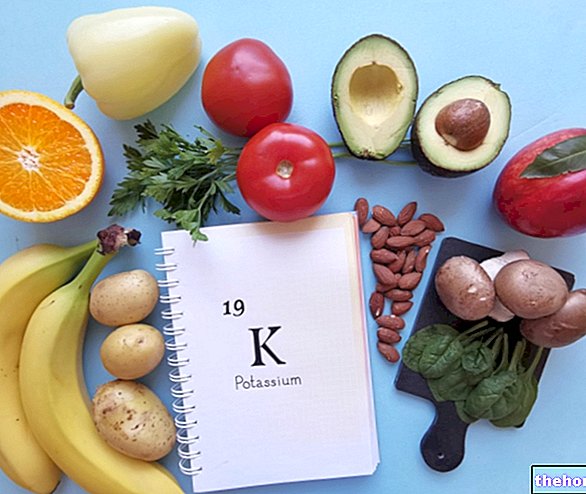
The body of an adult contains about 110-140g of potassium, or 1.6-2 g of mineral per kg of body weight; of these 5.9 g / l are found dissolved in the intracellular fluids and only 137-215 mg / l are found in the extracellular fluid.
it is closely linked to that of sodium (extracellular electrolyte) and is maintained above all thanks to the SODIUM-POTASSIUM pump. This trans-membrane structure represents a way for the passage of molecules against a concentration gradient, useful for controlling the osmotic pressure and the acid-base balance.
The extracellular portion of potassium is involved in the transmission of nerve impulses, in muscle contraction and in the regulation of blood pressure.
NB. The amount of potassium in the body is directly proportional to the cell mass, therefore, its body measurement is frequently used in estimating the individual lean mass.
The potassium intake with drinking water is variable (based on the quality of the water) but in any case not decisive with respect to the dietary one.
A sufficiently balanced diet and "on average" rich in potassium brings from 3 to 5g / day, while its urinary excretion is around 2.3g / day. Knowing the renal saving mechanisms of potassium, which in case of need would drastically limit its elimination, these values allow us to deduce that a potassium intake of 3-5g / day may be more than sufficient for the homeostatic maintenance of essential functions.
NB. The potassium balance in athletes is completely outside the above values; we remind you that, although it has been specified that NORMALLY the amount of potassium eliminated by sweating can be defined as almost irrelevant, a sportsman (especially endurance) can be subjected to repeated changes in the water balance that reach 3-4% of their body weight . In this case it is essential to evaluate the amount of the overall potassium dietary intake and possibly draw up a diet rich in trace elements; it is also possible and sometimes desirable to resort to hydro-saline food supplementation.
more used in food supplementation; this means that many subjects, with diet and supplements take a higher amount of potassium than their needs. However, assuming that the renal function is at least NORMAL, the pathological excess of potassium in the blood - termed hyperkalaemia or hyperkalaemia - it is unlikely to say the least. Potassium intoxication can occur in the clinic by excessive enteral or parenteral administration at doses> 17.5 g / day (3 or 4 times the mean dose).
NB. Acute hyperkalaemia can cause cardiac arrest.
NB. Hypokalaemia, in the most severe cases, can give rise to fatal cardiac arrhythmias and ileo-paralysis.
arterial and urinary excretion of potassium. It seems that a diet rich in potassium is essential for maintaining sodium homeostasis; in fact, subjects who do not reach satisfactory dietary levels of dietary potassium are not able to effectively eliminate sodium compared to those who have a diet rich in this mineral.
Ultimately, a potassium-rich diet can:
- Indiscriminately and significantly reduce mean systolic blood pressure
- Likely to decrease hypertension related deaths by up to 25%
NB. With a diet rich in fresh vegetables and fruit, it is also possible to achieve a potassium intake of more than 10g / day.






.jpg)





















